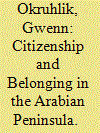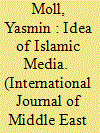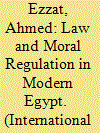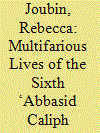|
|
|
Sort Order |
|
|
|
Items / Page
|
|
|
|
|
|
|
| Srl | Item |
| 1 |
ID:
175805


|
|
|
|
|
| Summary/Abstract |
In a tweet posted on 29 March 2018, a bidūn activist—who was later jailed from July 2019 to January 2020 for peacefully protesting against the inhumane conditions under which the bidūn are living—shared a video. The brief video zooms in closely on an ID card, recognizable as one of those issued to the bidūn, or long-term residents of Kuwait who are in contention with the state regarding their legal status. More precisely, the mobile phone camera focuses on the back of the ID card, on one line with a special mention added by the Central System (al-jihāz al-markazī), the administration in charge of bidūn affairs. Other magnetic strip cards hide the personal data written above and below it. A male voice can be heard saying that he will read this additional remark, but before even doing so he bursts into laughter. The faceless voice goes on to read out the label in an unrestrained laugh: “ladayh qarīb … ladayh qarīna … dālla ʿalā al-jinsiyya al-ʿIrāqiyya” (he has a relative … who has presumptive evidence … suggesting an Iraqi nationality). The video shakes as the result of a contagious laugh that grows in intensity.
|
|
|
|
|
|
|
|
|
|
|
|
|
|
|
|
| 2 |
ID:
175803


|
|
|
|
|
| Summary/Abstract |
This roundtable is an effort to challenge prevailing assumptions that have long dominated the general discourse about citizenship and belonging. We use the Arabian Peninsula as the site for our discussion. Our scope and purpose involve both theoretical innovation and empirical diversity. Participants are multidisciplinary and put forth ideas that move conversation on the politics of citizenship and belonging beyond the usual suspects: oil and arms, the rentier framework, social contracts that exchange welfare for loyalty, a simple state-centric lens, the primacy of tribal identities, the binary of local or foreign worker, and the binary of the Gulf Cooperation Council (GCC) or Yemen.
|
|
|
|
|
|
|
|
|
|
|
|
|
|
|
|
| 3 |
ID:
175810


|
|
|
|
|
| Summary/Abstract |
How do perceptions of not belonging inform economic life? For many young Omanis, the labor market is a site of contestation and a space of struggle. In this essay, I explore a neglected dimension of belonging in the Gulf—citizen labor—by looking at Omani millennials in the labor market. Despite holding legal citizenship, a sense of belonging remains elusive in much of the private sector. Many Omani young people perceive a tenuous economic citizenship, complicating narratives around belonging or not belonging in the Arabian Peninsula. I draw from lessons learned while researching my current book and exploring social relations and regulation of labor markets, and reflect on how the knowledge and theories produced concerning Gulf labor markets rarely engage with the citizens in them.
|
|
|
|
|
|
|
|
|
|
|
|
|
|
|
|
| 4 |
ID:
175806


|
|
|
|
|
| Summary/Abstract |
Texas A&M, a public land grant university in College Station, Texas, has a long history of engagement with the Bush family. These ties highlight the university's entanglement with US imperial enterprises, which extend into the Persian Gulf. George H. W. Bush's own explanation of why he decided to place his presidential library at the campus despite not attending Texas A&M focused on these connections: “Over the years, Aggies have provided great service to the Armed Forces of our country. Patriotism abounds at A&M.” Meanwhile, Qatar hosts the largest concentration of US troops abroad. The US military's Central Command is at Al Udeid Air Base, not far from the Education City complex that hosts TAMUQ and several branch campuses of American and other foreign universities. The students at these institutions are Qatari citizens, South Asian and Arab immigrants, and international students, primarily from Asia, Africa, and the Middle East.
|
|
|
|
|
|
|
|
|
|
|
|
|
|
|
|
| 5 |
ID:
175807


|
|
|
|
|
| Summary/Abstract |
Revolutions seldom involve more than one percent of the population. However, in Bahrain, a small island nation with a population of around 570,000, twenty percent of the population took to the streets in February 2011 to demand greater democratic reform, making it “proportionally one of the greatest shows of ‘people power’ in modern history.” The regime's response was disproportionally brutal. Saudi-dominated troops from the Gulf Cooperation Council Peninsula Shield Force were “invited to” or “invaded” Bahrain, depending on who is telling the story. Under cover of the Saudi military, Bahrain's security forces killed dozens of civilians, torturing, maiming, and raping many others. The arsenal of repressive techniques was exhaustive. Belonging also was used as a tool of repression, with many being stripped of their Bahraini citizenship on spurious, terror-related charges.
|
|
|
|
|
|
|
|
|
|
|
|
|
|
|
|
| 6 |
ID:
175809


|
|
|
|
|
| Summary/Abstract |
A woman takes on work repairing cell phones in a small town in the southern governorate of Lahj. In Aden, an ‘aqīla (neighborhood representative) refuses to authorize the marriage of an underage girl. In a rural village outside of Sana'a, women petition the shaykh for permission to build a community center in which they can market home crafts to other women. Young women and men in Ibb and in Hadramawt work as volunteer teachers and coordinate with very different municipal authorities to ensure children can learn. And in the divided city of Taiz, a youth organization trains internally displaced Yemenis in the maintenance of the solar technologies that are keeping the city running.
|
|
|
|
|
|
|
|
|
|
|
|
|
|
|
|
| 7 |
ID:
175798


|
|
|
|
|
| Summary/Abstract |
The emergence of Islamic television in the Arab Middle East is usually explained as part of a Saudi media empire fueled by neoliberal petro-dollars. This article, by contrast, takes seriously the role ideas played alongside changing political economies in the origins of the world’s first Islamic television channel, Iqraa. Focusing on the intellectual and institutional career of “Islamic media” (al-i’lām al-Islāmī) as a category from the late sixties onwards in Egypt, I argue that Islamic television is part of a broader decolonization struggle involving the modern discipline of mass communication. Pioneering Arab communication scholars mounted a quest for epistemic emancipation in which the question of how to mediate Islam became inextricable from the question of what made media Islamic. Drawing on historical and ethnographic research, I show how the idea of Islamic media involved a radical reconceptualization of the Qur'an as mass communication from God and of Islam as a mediatic religion. This positing of an intimate affinity between Islam and media provoked secular skepticism and religious criticism that continue to this day. I conclude by reflecting on how the intellectual history of Islamic media challenges dominant framings of epistemological decolonization as a question of interrogating oppressive universalisms in favor of liberatory pluralisms.
|
|
|
|
|
|
|
|
|
|
|
|
|
|
|
|
| 8 |
ID:
175800


|
|
|
|
|
| Summary/Abstract |
This article examines the historical roots of juridical moral regulation in modern Egypt, assessing the relationship between modern law and shariʿa through the lens of the influence of the Islamic practice of ḥisba on courts and legislators. The article engages critically with scholarship on Islamic law and postcolonial theory regarding the impact of Western colonialism on law in Muslim societies and problematizes the understanding that shariʿa was secularized in the Egyptian legal culture through the translation of Western legal concepts. Instead, a different narrative is offered, one that recognizes the agency of local actors in the process of secularization and considers the influence of shariʿa in the legal development of contemporary Egypt.
|
|
|
|
|
|
|
|
|
|
|
|
|
|
|
|
| 9 |
ID:
175808


|
|
|
|
|
| Summary/Abstract |
On 25 October 2017, the Saudi Arabian regime granted citizenship to Sophia, a humanoid robot developed in Hong Kong. Sophia became the world's first robot citizen. Some of the globe's wealthiest investors, foreign dignitaries, and foremost economists, journalists, and public relations experts celebrated the conferral firsthand. They were guests of Crown Prince Mohammed bin Salman in Riyadh, where they attended the inaugural Future Investment Initiative. Sponsored by Saudi Arabia's sovereign wealth fund, the forum heralded the regime's renewed commitment to diversify the country's petro-economy, develop its human capital, and increase its global investment competitiveness. The national reform plan, dubbed Vision 2030, dominated the event's discussions. Vision 2030 was an ambitious blueprint that had as its goal nothing short of overhauling everyday life in Saudi Arabia. It entailed revamping bureaucratic capacity, building global gigacities, and opening the country to visitors and investors alike. Developing the tourism and entertainment sectors were key. Through these lucrative socio-technical experiments, the regime hoped to tackle the dire economic, financial, and social challenges it faced. To appeal to the global investor, it framed the reforms in the language of high-tech modernization, sustainable development, and socioreligious tolerance. Sophia, and all the trappings of modernization that “she” embodied, epitomized the ruling class's entrepreneurial vision for a new Saudi Arabia, and in turn, a new global citizen: the naturalized elite as well as the new Saudi Arabian citizen-subject (Fig. 1).
|
|
|
|
|
|
|
|
|
|
|
|
|
|
|
|
| 10 |
ID:
175799


|
|
|
|
|
| Summary/Abstract |
A vast array of narratives found in medieval historical chronicles and literary sources have referenced the particular ways in which the culture associated with the ‘Abbasid caliphate diverged from a binary model of gender. Despite debate about the historical accuracy of these early chronicles, the repeated references to the sixth ‘Abbasid caliph Muhammad al-Amin's non-heteronormativity indicate at least a kernel of truth. This article examines the collective memory construction of al-Amin in the Egyptian series Harun al-Rashid (1997) and two Syrian series, Abna’ al-Rashid: al-Amin wa-l-Ma'mun (The Sons of al-Rashid: al-Amin and al-Ma'mun, 2006) and Harun al-Rashid (2018). These contemporary portrayals of the life of al-Amin simultaneously illustrate the process by which history is altered by authorial perspective and the erasure of nonheteronormative space within the ‘Abbasid caliphate. My own authorial perspective inclines toward an interpretation of al-Amin as queer; through this lens, an inspection of wide-ranging accounts of al-Amin's life reveals the historical biases of his time and our current moment, too, as historians then and now variably recognize al-Amin's queerness in constructing collective memory. Some have argued that anti–al-Amin chroniclers may have engaged in historical revisionism and referred to al-Amin as queer to discredit the caliph, but ultimately, whether or not this is true, the current application of those early references by contemporary screenwriters is the most revealing historiographical decision, as his many representations serve as a mirror for our contemporary subjectivities, interests, and agendas. At a time when queer lives and experiences are notably absent from traditional historical narratives, this article proposes that regardless of the accuracy of the original sources, the absence itself in contemporary portrayals is significant, as patterns of exclusion yield tangible meaning. In this particular case, the ready elimination of queerness from contemporary narratives shows the ways in which queerness is vulnerable to erasure in favor of other, more politically expedient identity characteristics and values.
|
|
|
|
|
|
|
|
|
|
|
|
|
|
|
|
| 11 |
ID:
175797


|
|
|
|
|
| Summary/Abstract |
The camp and the city are both important for understanding the relationship between space and identity in the refugee experience of exile. In the Palestinian example, the camp has emerged as a potent symbol in the narrative of exile although only a third of refugees registered with UNRWA live in camps. Moreover, the city and urban refugees remain missing in most of the scholarship on the Palestinian experience with space, exile, and identity. Furthermore, there is little attention to how refugees understand the concept of the city and camp in their daily life. This article examines how Palestinian urban refugees in the Old City of Damascus conceptualized the relationship between the camp and the city. It illustrates how the concept of the camp remained necessary for the construction of their collective national identity while in Syria. However, the city was essential in the articulation of individual desires and establishing social distinction from other refugees. Thus, during a protracted exile it is in the interstice between the city and the camp, where most urban refugees in the Old City situated themselves, that informed their national belonging and personal aspirations.
|
|
|
|
|
|
|
|
|
|
|
|
|
|
|
|
| 12 |
ID:
175801


|
|
|
|
|
| Summary/Abstract |
The present article is a study of provincial administration in the nineteenth-century Ottoman Albania and Kurdistan. It examines the transformation of provincial administration in Dibra and Hazro after two towns’ hereditary rulers were exiled. Focusing on the employment patterns of the notables in exile as well as the ones who occupied the posts in the absence of the former, this study challenges the binary framework mostly employed in conceptualizing the making of the modern Ottoman state. Particularly, the employment of the notables exiled to the distant parts of the empire necessitates a revision in the presumptions about the origins of appointed Ottoman officials. By focusing on the partnership operating by means of employment, this study argues that the making of Ottoman state follows a trajectory of flexible centralization based on the partnership between the government and notables, terms of which were constantly negotiated.
|
|
|
|
|
|
|
|
|
|
|
|
|
|
|
|
| 13 |
ID:
175802


|
|
|
|
|
| Summary/Abstract |
Due to the illegal movement of goods and people, the Khuzistan-Basra frontier, like many other borderlands in the region, represented a liminal space for border dwellers and the Iranian state. Although scholars have written about the migration that was endemic to the early nation-building period, the consequences of this movement in the latter half of the 20th century require further exploration. Well into the 1970s, Iranian migrants and border dwellers complicated citizenship, evinced by the Pahlavi monarchy's failure or refusal to offer them their rights. The Iranian archives prove that, decades into the nation-building project, local dynamics continued to exert tremendous influence on Iranians and even superseded national policies.
|
|
|
|
|
|
|
|
|
|
|
|
|
|
|
|
| 14 |
ID:
175804


|
|
|
|
|
| Summary/Abstract |
One would think that, after years of fieldwork and writing, I would be able to answer a pretty simple and straightforward question about who exactly I interviewed for my study of citizenship boundaries in the UAE: “Do you have any notion of the proportions [of interlocuters] of the different ethnic or descent lines that you spoke to?” This essay is about why it is so difficult to answer this question and the insights into citizenship that unfolded as I searched for an empirical answer. Spoiler alert: Answers to questions about “national” or “ethnic” origin are entirely dependent upon how we count—and miscount—time.
|
|
|
|
|
|
|
|
|
|
|
|
|
|
|
|
| 15 |
ID:
175811


|
|
|
|
|
| Summary/Abstract |
There is no precise English equivalent to this Hindustani proverb. A rolling stone gathers no moss, between the devil and the deep blue sea, between a rock and a hard place, torn between two masters—none of these really fit. The dhobi ka kuta is the dog who figuratively and literally runs every day between two places, two obligations, and two choices. Does he stay behind to guard the master's house or does he guard his master as he washes clothes by the river? There will be a trade-off either way. The phrase does not conjure up vagabond restlessness or nomadic liberation. It evokes the anxiety of rootlessness, and the lack of certainty about choice and loyalty. It is about the doubt cast your way for not picking one thing over the other. It is about being stuck in the vagaries of the in-between.
|
|
|
|
|
|
|
|
|
|
|
|
|
|
|
|
|
|
|
|
|